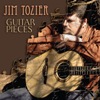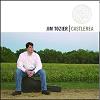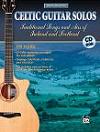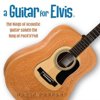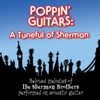| Reviews: Delovely Guitar |
| Dave Walker |
March 2009
When producer James Jensen took to the stage on the day before Valentine's Day 2005, accompanied by guitarists Laurence Juber, Doug Smith, and Mark Hanson, it was to receive the Grammy for Best Pop Instrumental Album for the CD
Henry Mancini: Pink Guitar. This was a proud moment for acoustic guitarists and fans everywhere, as well as for the magnificent work of Solid Air Records and their artists. Soon their minds turned to the question: "What next?"
Apparently they had no trouble deciding that their next collaborative CD would feature the songs of another great American songwriter, Cole Porter. A unique character, Porter came from a wealthy family, receiving music lessons from the age of six on violin, piano, and music theory. He wrote his first operetta at 10, and continued to study music at Yale, rejecting a brief stint in Law School. After failing to achieve success on Broadway in the 1910's, he moved to Paris where he led a "colorful, Bohemian life" while continuing to write songs. Many of these would become hits when he returned to the USA and began one of the most successful songwriting careers on Broadway, as well as Hollywood.
Some might think Porter an unlikely choice for an instrumental album because of the wit, charm, and general urbanity of his lyrics. Fortunately his melodic gift was no less singular, and many of his songs are instantly recognizable. (Indeed, he was forced to settle for instrumental versions of his song "Love for Sale" in the 1930s, when it was judged too "explicit" for radio play!)
Doug Smith leads off the CD with his carefully crafted rendition of Anything Goes. Beginning with a pseudo-severe "flamenco march", he soon glides into a dainty presentation of the melody on harmonics. The melody then appears full-fledged with light chordal accompaniment before revving up into a full fingerstyle treatment of the tune. Now we're swinging, and Smith can't keep from joining in with some joyful percussion to accent his flying guitar work. A quick survey of several keys leads back to a grand, victorious presentation of the main theme. Fun stuff and we are off to a rollicking start.
Next Nick Charles treats us to I Get a Kick Out of You, opening softly and moving into a gentle swing. Charles clearly gets a kick out of playing this great melody, adding in some great guitaristic improvisation and enhancements without once losing the character of the piece or the mood of his arrangement. Nice!
With You'd Be So Nice To Come Home To, Eltjo Haselhoff has his work cut out for him. Many fingerstyle guitarists will remember the wonderful version of this tune done by Chet Atkins on his album Me and My Guitar. Like Chet, Haselhoff begins with a slow introduction, but he continues on to the melody at the same slow tempo, savouring every note and chord beautifully. He segues into a laid-back, swinging Chet-style version but at a still-relaxed tempo. The accompaniment presents a series of cascades, walking basses, and even a boogie bass at times, until the melody dissolves into harmonics and rubato chords. Porter would be proud, and so would Chet.
David Cullen has the honour of presenting Night and Day, that favourite of jazz musicians everywhere. Cullen begins with a straightforward presentation before taking off into some very jazz improvisations over the basic harmonic structure. The variations get progressively more interesting in another fine arrangement.
Mark Hanson leads us straight into Let's Do It, playing with a verve and aplomb that Porter's music so richly deserves. Hanson's playing shows a light-hearted mastery that at times makes it sound too rich for a single guitar, at others like a duet with bass, all the while sounding effortless and fun. This one will get your foot tapping, your head bobbing, and your fingers snapping.
The hammered octave riff of the next song immediately tells us that Laurence Juber is "in the building." What emerges is a great version of I've Got You Under My Skin. LJ seems to be bursting with ideas here, as each millisecond seems filled up with terrific polyphonic melody, counter-melodies, riffs, and accompaniment figures. These seem to draw the melody into their orbits, as it alternately varies to suit now one, now the other, before again emerging whole. Although the actual density of the arrangement suggests a guitarist being "paid by the note" the effect of this one is is of energetic, highly emotional sincerity, and as such it is a perfect vehicle for this song. What a marvellous solution to the problem of setting such a familiar song that really needs to maintain its own tempo, and yet not succumbing to a "yet-another-ballad" treatment. Bravo!
A soft series of chords leads us into Mike Dowling's arrangement of What Is This Thing Called Love. The tentative effect of the chords complements the questioning idea of the song. It gets more immediate with melodic excursions that include bent strings and descending bass lines that accentuate the search, finally ending in an unassuming, charming close. This song is the perfect foil to LJ's previous arrangement.
Begin the Beguine is notable for its unique structure, a departure from the 32-bar norm of the time, and one that Porter himself claimed not to be able to remember without his score in front of him. The beguine is a lively ballroom dance, but Jim Tozier plays this song in a pensive, meditative manner. The brooding low chords seem to be dragged along by a determined melody. The transformation of the tune works wonderfully well.
Lasse Johansson starts off Don't Fence Me In with an almost classical simplicity giving it something of a "fenced in" character, before he finally loosens the reins into an easy-going classic fingerstyle groove. He weaves in some subtle cascading and chromatic harmonies before a short return brings us to the end.
My Heart Belongs To Daddy sounds almost like a standard chord melody solo. Jim Earp sets the melody in slow temp to a simple undulating chordal accompaniment that emphasizes the almost fatalistic downward drift of the melody.
By contrast, Love For Sale begins with a surfeit of energy that seems to brim over into snaps and slaps, slides and sinewy chromatic lines, and spicy dissonances until the melody surfaces, gliding along with elan atop a glittering musical background. In this satisfyingly sassy arrangement, we never know if Wayne Johnson will zig, zag, or just stop on a dime and change direction. Once again, a nice depiction of the gist of the lyrics without any need for words. Some great playing all in the service of the song.
Brooks Williams then gives us a suavely swinging rendition of You're the Top. A change of tempo in the middle provides a strong contrast while maintaining the original swing, and effortlessly floating back to it again. Then it's on to a pretty cool ending.
Kenny Sultan jumps right in with his frenetic version of Let's Misbehave. Porter meets elements of ragtime and even a little bluegrass, all given a slightly bluesy twist. After just over two and a half minutes this breathless romp ends, leaving us wanting more!
True Love presents us with our final soloist, Tim Pacheco. This is a suitably romantic setting for a simple love song, one without irony or another arch emotion to undercut its sentimentality. This straightforward performance portrays the pure bliss of the couple on their honeymoon.
At this point you may be wondering where the album's namesake is. No need to worry - Delovely has been held in reserve as a bonus duet between Mark Hanson and Doug Smith. It is certainly worth the wait! What a great capstone to a great album. These fine guitarists are very comfortable with one another, and their precision is the icing on the cake of this fine arrangement. What more could one ask?
This collection is a worthy successor to
Pink Guitar and in my opinion just as worthy of a Grammy. The arrangements are original and flawlessly played. Unlike another anthology of Cole Porter "hits" in my collection, there are no glaring stylistic shifts or performance inconsistencies here, just fine versions of a terrific choice of songs.
Buying this one is a no-brainer.
» See the review at
Dave Walker's website
by Patrick Ragains, July/August 2007
This anthology, drawn from Cole Porter's most familiar songs, follows on the heels of Solid Air's
Henry Mancini: Pink Guitar, which won a Grammy Award in 2004 for best pop instrumental album.
Delovely Guitar repeats the formula, this time showcasing 14 guitarists from the label's impressive roster in one solo performance each, with one duet closing the program.
The CD begins with Doug Smith playing "Anything Goes," which employs harmonics, octaves, alternating bass and an unexpected shift of the melody on to the bass strings, leading into a key change. Nick Charles offers a similarly well-developed arrangement of "I Get a Kick Out of You." Likewise, Eltjo Hasselhoff's "You'd Be So Nice to Come Home To," frames a Chet Atkins-influenced treatment with a jazzy, rubato introduction and coda. Lawrence Juber creates a pop setting for "I've Got You Under My Skin," dishing out his trademark octave runs, close jazz chord voicings and treble bends in a very pleasing performance.
Both David Cullen's "Night and Day" and Wayne Johnson's freewheeling "Love for Sale" are played on nylon-string guitars. These two cuts may be the most successful interpretations on the disc, at least for listeners expecting to hear mainstream jazz versions of this material. Similarly, Mike Dowling offers a sensitive chord melody reading of "What is This Thing Called Love," although played on a steel-string guitar.
"Begin the Beguine" gets a dark, dirge-like treatment from Jim Tozier, and may be the most radical reimagining of any of the compositions included here. As counterweights, Lasse Johansson and Kenny Sultan lighten things up by recalling classic ragtime and Blind Blake in their selections. The CD ends with Mark Hanson and Doug Smith dueting on a pretty, stately "Delovely."
This anthology deserves a reception equal to that of
Pink Guitar, although Cole Porter's music comes from an earlier time than Henry Mancini's and consequently may be more difficult to recast for solo steel-string guitar. Many guitarists and general listeners are sure to grab this disc - they won't be disappointed.
» See the review at
Minor 7th
by Hank te Veldhuis, May 2007
Just as their earlier Grammy-winning Henry Mancini
Pink Guitar
CD, Solid Air Records proceeds releasing a top-notch CD of the
legendary Cole Porter. All pieces are written for acoustic guitar,
with 15 of Solid Air Records best acoustic guitarists. All guitarists
made their own creative touch to Cole Porter's compositions.
Eltjo Haselhoff's interpretation of "You'd Be So Nice To Come Home
To" impresses a lot, just like David Cullen does on "Night and Day."
Laurence Juber excels on "I've Got You Under My Skin" and Jim
Tozier on "Begin The Beguine." Wayne Johnson's approach to "Love
For Sale" is brilliant. Just as Tim Pacheco's contribution on "True Love."
Check out your own favourite guitarists on another interesting release
of Solid Air Records.
» See the review at
Bridge Guitar Reviews

